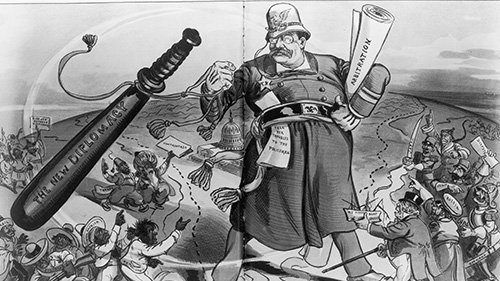Tips for the AP® Gov FRQ
The Free-Response Question (FRQ) portion of the Advanced Placement® exam provides test takers with the opportunity to demonstrate their knowledge on...
AP & Honors Mathematics
Explore Wiley titles to support both AP and Honors mathematics instruction.
Literacy Skills & Intensive Reading
Connections: Reading – Grades 6–12
Empower student success with a proven intensive reading program that develops strong reading skills in striving readers.
Drama, Speech & Debate
Basic Drama Projects 10th Edition
Build students’ confidence and competence with comprehensive, project-based theatre instruction.
Literature
Connections: Literature
Support learners as they study dynamic, relevant texts and bring the richness of diverse voices to students through literature.
Literature & Thought
Develop critical thinking, reading, and writing across literacy themes, genres, historical eras, and current events.
Language Arts
Vocabu-Lit® – Grades 6–12
Help students build word power using high-quality contemporary and classic literature, nonfiction, essays, and more.
Connections: Writing & Language
Help students develop grammar, usage, mechanics, vocabulary, spelling, and writing and editing skills.
Reading/English Language Arts
Measuring Up to the English Language Arts Standards
Incorporate standards-driven teaching strategies to complement your ELA curriculum.
English Language Learners
Measuring Up for English Language Learners
Incorporate research-based best practices for ELLs with an approach that includes a focus on language acquisition strategies.
Mathematics
Measuring Up to the Mathematics Standards
Incorporate standards-driven teaching strategies to complement your mathematics curriculum.
Foundations
Measuring Up Foundations
Help students master foundational math skills that are critical for students to find academic success.
Science
Measuring Up to the Next Generation Science Standards
Give students comprehensive NGSS coverage while targeting instruction and providing rigorous standards practice.
Assessment
Measuring Up Live
Deliver innovative assessment and practice technology designed to offer data-driven instructional support.
For a better website experience, please confirm you are in:
2 min read
David Wolfford Jun 17, 2021 1:33:03 PM

Though the College Board’s AP® United States Government and Politics FRQs #3 and #4 may be more involved and seem more challenging, FRQ #1 and #2 can be tricky for students. Data sets and primary reading passages can be intimidating.And a careless answer without expressed detail could result in a failure to earn full points. So, a little thoughtful strategy for #1 and #2 could enhance scores and perhaps increase the student’s overall score.
Since the Redesign, the College Board® has only created and released a few FRQ examples. These tell us a few things. The scenario prompt #1 usually presents a situation or issue that could allow for a policy change by some governing body. It calls on student knowledge of interaction between branches or linkage institutions in policymaking. Free-response #2 presents a statistical depiction relevant to some Government and Politics concept or reality. The charts and graphs in these early examples seem a little more complicated than those that accompanied the multiple-choice questions on the old AP® Exam. There’s usually enough data and categories for students to identify multiple trends and to make more than one comparison. But the test-makers seem to be keeping them simple enough to answer the four accompanying prompts.
Those who are comfortable with explaining primary sources and data might say of #1 and #2, “Much of the answer to these questions is right in the accompanying quote or data set.” This may be true, but students still need to know and present the governing and political concepts that are lodged somewhere in their heads. And they need to connect these functions and customs with the information presented.
Instruction on technical writing could be effective for improving responses on #2. The other day, I had a student describe a line in a line graph that “increased exponentially,” when it really “rose steadily.” Students should be cautious to not confuse causation with correlation. Extra consideration of such word choice could maintain accuracy and convey ideas better. Capitalized proper nouns and regular vocabulary terms should stand out in the response. Using an active voice certainly helps. Are your students explaining how something happened or are they explaining how some government body or some linkage institution acted to cause a unique or expected outcome? The latter, though not required, will usually prove their knowledge more so. And of course, it tightens up the writing and is on par with a college-level prose.
Learn more about these FRQs in the recorded webinar below. We’ll take a look at additional strategies, examine some FRQ examples, and share some tips for creating your own. We’ll take a brief look at my website, USGOPO.COM, where you can find additional FRQs. I discuss these FRQs alongside veteran AP® Government teacher, table leader, and master craftsman Brian Stevens. We realize every student won’t get a 5, but we’ll do our best to raise averages and perhaps advance a few kids into their college experience.
David Wolfford teaches Advanced Placement® U.S. Government and Politics at Mariemont High School in Cincinnati, Ohio, and has served as an AP® Reader. He has a B.A. in Secondary Education and an M.A. in Constitutional and Legal History, both from the University of Kentucky. He has conducted historical research projects on school desegregation and American political history. David has published in historical journals, such as Ohio Valley History and Kentucky Humanities. He has written on government, politics, and campaigns for national magazines and Cincinnati newspapers. He is a James Madison Fellow, a National Board-certified teacher, and a regular contributor to Social Education. David is editor of By George: Articles from the Ashland Daily Independent (Jesse Stuart Foundation) and editor of Ohio Social Studies Review.
Advanced Placement® is a trademark registered and/or owned by the College Board, which was not involved in the production of, and does not endorse, this product.

The Free-Response Question (FRQ) portion of the Advanced Placement® exam provides test takers with the opportunity to demonstrate their knowledge on...

Political cartoons have influenced the public and brought about change like other tools in the press. The historic 1754 cartoon of a sliced-up snake,...

You know the Style #4 Free Response Question on the College Board’s national Government exam can be a real challenge. I am talking about the argument...

Each year after the AP® exam I ask students to evaluate my class. Last year, they overwhelmingly identified that they wanted to work on FRQs more...

It’s about that time. The Advanced Placement® Government & Politics Exam is around the corner. I’m sharing my top five tips to help you prepare...

The argumentative essay question on the AP U.S. Government and Politics exam demands a synthesis of content knowledge, analytical skill, and...

Teaching a young, eager, and naive student how to write a sophisticated DBQ is like teaching a similarly inexperienced athlete how to successfully...

In 2021, the College Board® added a new section to the AP® U.S Government and Politics Exam: quantitative analysis. This counts for four raw points...

Do you need ideas or extra support helping students review for the AP® European History Exam? Join me as I share my content review resources and...

Perhaps you heard of that Supreme Court decision handed down last year, where citizens and an interest group challenged a government-run World War I...

Join AP experts Brandon Abdon, Colin Baker, and Bob Topping to discover scaffolded approaches to teaching the APUSH, AP Euro, and AP World History...

Discover how simulations can enhance learning in AP® U.S. Government and Politics. Engage students with hands-on activities like discretionary...
